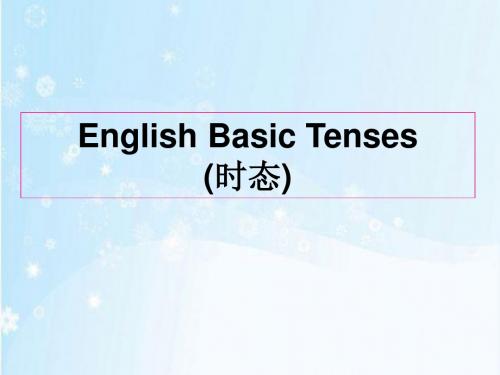高中英语动词时态复习课件.
合集下载
【高三一轮复习语法】动词的时态与语态(共28张ppt)

②在条件状语从句和时间状语从句中用一般现在时表将来(主将从现)。 If you leave tomorrow , I'll see you at the airport. 如果你明天走,我到机场送你。 When she comes, I'll tell her about it. 她来时我将把这件事告诉她。 (2)现在进行时表将来 现在进行时表示将来,往往是指计划好或准备要做的事。一些表示动作 转换的动词,如go, come, leave, start, begin,stay,take off,arrive等,或 者也称为位移性动词,其进行时表示马上要做某事。
• He used to get up early . 过去他总是早起。(现在不这样了) • He will be used to getting up early . 他将会习惯早起。 • Wood is used to make paper. 木材被用来造纸。
(三)一般将来时
1、表示将要发生的动作或存在的状态,常用的时间状语有later(on), soon, in a month, next time, from now on, tomorrow等。 I shall be eighteen years old next year. 明年我就十八岁了。 2、一般将来时的其它表示形式 (1)一般现在时表将来 ①按照计划或时刻表要发生的事情。 The new library opens next month. 新图书馆下月开放。 The plane takes off at 3:00 P.m. 飞机于下午三点起飞。
We are about to discuss this problem.我们将马上讨论这个问题。 They were about to leave when the telephone rang. 他们正要离开时电 话响了。
高中英语英语时态完整版 PPT课件 图文

英语的时态
一、一般现在时
一直以来的习惯动作;目前状态;规律
一般现在时
单三人称:动词 s或es 非单三人称:动词原形
动词第三人称单数的变化规则
1、直接在动词后+s
like- likes
play-plays
2、以s, x, sh, ch, 接尾的动词:+es
wash-washes
3、以辅音+o接尾的动词:+es
go-goes
4、以辅音+y接尾的动词:变y为i+es
fly-flies
一、一般现在时的用法
1) 经常性或习惯性的动作,常与表示频度的时间状 语everyday, often, always, once a week, seldom, usually等连用。
I leave home for school at 7 every morning. He cycles to work every day. 2) 客观真理,客观存在,科学事实。 The earth moves around the sun. Shanghai lies in the east of China. Water boils at 100 centigrade degrees.
一、基本概念:
过去将来时表示从过去的某一时间看将要发生的动作或存在的状态。 它是一个相对的时态,即立足于过去某时,从过去的某一时间看即 将发生的事情就要用这一时态。 1) He said his mother would buy a bike for him 2) My brother told me he wouldn’t believe Jack any more. 3) Would it be all right if he knew his illness?
一、一般现在时
一直以来的习惯动作;目前状态;规律
一般现在时
单三人称:动词 s或es 非单三人称:动词原形
动词第三人称单数的变化规则
1、直接在动词后+s
like- likes
play-plays
2、以s, x, sh, ch, 接尾的动词:+es
wash-washes
3、以辅音+o接尾的动词:+es
go-goes
4、以辅音+y接尾的动词:变y为i+es
fly-flies
一、一般现在时的用法
1) 经常性或习惯性的动作,常与表示频度的时间状 语everyday, often, always, once a week, seldom, usually等连用。
I leave home for school at 7 every morning. He cycles to work every day. 2) 客观真理,客观存在,科学事实。 The earth moves around the sun. Shanghai lies in the east of China. Water boils at 100 centigrade degrees.
一、基本概念:
过去将来时表示从过去的某一时间看将要发生的动作或存在的状态。 它是一个相对的时态,即立足于过去某时,从过去的某一时间看即 将发生的事情就要用这一时态。 1) He said his mother would buy a bike for him 2) My brother told me he wouldn’t believe Jack any more. 3) Would it be all right if he knew his illness?
高中英语语法:动词的时态课件(共55张PPT)

In the evening, I often watch TV series or sport and then news again.
晚上20,20/8/2我0 通常看电视剧或体育节目,然后再看新闻。
6
一、一般现在时
①表示经常性、习惯性的动作,常与often,usually,always, sometimes,every day等时间状语连用。 I enjoy swimming, a lot and I love diving.我很喜欢游泳,也很喜欢 潜水。 ②表示现在的特征或状态。 The shop is open eight hours a day.这家商店每天经营8小时。
层。
Quality comes before quantity.质量重于数量。(客观真理)
(2)表示按时间表、规定、计划或安排将要发生的动作,常用be,go,
arrive,leave,start,stay,begin等短暂性动词。
Hurry up!Our class begins at 8 o’clock. There is only 5 minutes left.快点儿,
我们8点开始上课。还剩5分钟了。
The plane leaves at three sharp.飞机3点整起飞。
(3)在时间、条件、方式、让步状语从句中表示将来的动作。
Our guides will have guns with them to scare the animals away if they come too
read reads读
write writes写
become becomes变成
know knows知道
2020/8/20
高考英语动词时态复习课件

14
“You can cut off my branches to build your house. So you will feel happy.”
15
So the boy cut the branches off and left happily.
16
For a long time , the boy came back. “I am getting old. I want to go sailing to relax myself. Can you give me a boat?”
39
Writing
假设你是李华,十八岁生日后,有种长大成人 的感觉。请你用至少3种时态,每种时态1-2个 句子谈谈父母对你的关怀和你今后的打算。
1. 过去父母对你的关爱 (一般过去时) 2. 现在你的感激 (一般现在时,现在进行时…) 3. 将来的打算 (一般将来时)
40
5
He climbed to the tree top.
6
Ate the apples.
7
He loved the tree and the tree was very happy.
8
Time went by...
9
The little boy had grown up.
10
One day, the boy came to the tree.
11
“I have grown up, and I need money.”
12
“You can pick all my apples and sell them. So, you will have money.”
13
After many years, the boy returned. “I am finding a house for shelter. Can you help me?”
“You can cut off my branches to build your house. So you will feel happy.”
15
So the boy cut the branches off and left happily.
16
For a long time , the boy came back. “I am getting old. I want to go sailing to relax myself. Can you give me a boat?”
39
Writing
假设你是李华,十八岁生日后,有种长大成人 的感觉。请你用至少3种时态,每种时态1-2个 句子谈谈父母对你的关怀和你今后的打算。
1. 过去父母对你的关爱 (一般过去时) 2. 现在你的感激 (一般现在时,现在进行时…) 3. 将来的打算 (一般将来时)
40
5
He climbed to the tree top.
6
Ate the apples.
7
He loved the tree and the tree was very happy.
8
Time went by...
9
The little boy had grown up.
10
One day, the boy came to the tree.
11
“I have grown up, and I need money.”
12
“You can pick all my apples and sell them. So, you will have money.”
13
After many years, the boy returned. “I am finding a house for shelter. Can you help me?”
高考英语复习——动词时态语态.ppt

(二)过去完成时 1 一件事情发生在过去,而另一件 事情先与他发生,发生在前的事 情的动词需用过去完成时。时间 状语用before
He said that he had been abroad for 3 years.
2表示从过去某一时间开始,一直延续 到过去的另一时间的动作
about it yet
He wrote many plays when he was at college.(写剧本是他过去做的事情) He has written many plays.(这意味着他是剧作 家) I saw Hero last year.(看英雄的时间是去年且 与现在无关) I have seen Hero before.(以前看过,强调现在 知道这部电影的内容。before:"以前"是表示一 个与现在有联系的时间,而不是一个确定的与 现在无关的过去时间)
It was ten years since we had had suan a wonderful time.
5 That/It/This was the first/second…time+that从句。that从 句的谓语要用过去完成时
That was the first time that I exam.
动词时态 和语态 一 时态
一 一般体中的一般现在时 一般过去时分别 表示现在 过去的经常性 习惯性动作或状态。 所谓一般体,表示既不 进行,又不完成
We day.
have
meals three times a
He is always ready to help others.
When I was a boy,I often went that park. to play in
高中英语动词时态复习课件28共55张PPT29

一、 一般现在时 (The Simple Present tense )
1. 结构: do/does
2. 用法: 1) 经常性或习惯性的动作,常与表示频 率的时间状语连用,如often, usually, always, every day/year, sometimes, on Sunday等。
I study hard every day and I get along well with my classmates, but sometimes I miss my families.
2)表示不受时间限制的科学事实或客观真理。
The earth moves around the sun.
3)表示主语的特征、性格、能力等 Mr. Smith hates fish and never eats any. Mary speaks both English and French very well.
English Basic Tenses (时态)
他每天都来。 He comes every day. 他昨天来了. He came yesterday. 他已经来了. He has come. 他明天来. He will come tomorrow.
汉语借助词汇手段而非词的形态变化来 表示动作的发生,而英语主要通过谓语动词 时态变化来表现.任何句子都要先注意时态.
②would 注重过去习惯性发生的动作。
1.At the end of the meeting, the headmaster gave (give) us a talk.
2.Listen! The radio says a serious accident _h_a_p__p_e_n_e_d (happen) last night.
高中英语语法 动词的时态、语态(共37张ppt)
❶表示在确定的过去时间里所发生的动作或存在的状态,常有表示过去时间的状语,或
有上下文暗示;还可表示 表示在过去一段时间内,经常性或习惯性的动作。
❷在时间、条件、让步状语从句中,若主句用了过去将来时,从句常用一般过去时表示
过去将来的意义。
❸有些动作发生的时间没有具体表明,但实际上是‘刚才,刚刚”发生,或者是表示说话人
1
问题诊断
2020/6/26
2
Ⅰ. 单句语法填空
1. Diets have changed in China—and so too has its top crop. Since 2011,the
country _h__a_s_g_r_o_w__n__ (grow) more corn than rice.(2018·全国卷Ⅱ)
were
2. It was Monday morning,and the writing class had just begin. (2018·全国卷Ⅲ)
begun
3.I had grown not only physically,but also mentally in the past few
I am going to buy some books with my sister this afternoon. 我打算下午和姐姐去买些书。 Look at the clouds. It is going to rain. 看那些乌云。天要下雨了。
2020/6/26
13
三、一般将来时
3 be to +动词原形, 表示按计划进行的动作或征求对方意见。还可 表示吩咐、命令、禁止、可能性等。
会20议20/6/2将6 于今天下午3点举行。
高考复习动词时态和语态PPT课件
将来完成时
by +将来时间, by then, by the end of + 将来时间, by the time you do sth, …
.
8
考题点击1、2
一般现在时
1. Months ago we sailed ten thousand miles
across this open sea, which _B__ the Pacific, and
The plane ___ta_k_e_s___(take) off at 8:00a.m.. It is 7:10a.m. now. We must hurry up.
4. 一般现在时表示按安排或计划要做的动作(有具 体的时间状语)。限于come, go, leave, begin, start, end, open, close, return, arrive, take off, stop, depart等。
easy task because technology __A___ so rapidly.
A. is changing
B. has changed
C. will have changed D. will change
选择移动电话难的原因是由于科技正在飞速发展,表日新
月异的变化,所以要用现在进行时。
.
15
◆We must look around when _c_r_o_s_s_i_n_g_(cross)
the road.
when we are crossing the road
Take care while __ri_d_i_n_g__(ride) a bicycle.
while you are riding a bicycle
动词时态课件
eg.The sun rises in the east. Light goes faster than sound
(4)用于状语从句代替一般将来时 eg.You will succeed if you try .
I will tell him about it as soon as I see him next Monday.
③ 用于"I expect, I'm sure, I think, I wonder + 宾语从句"中。 I don't think the test will be very difficult.
Look at the black clouds. It ______ soon.
--- Sure. If only we ______ out. A. is raining; didn’t come B. is to rain; won’t start C. will rain; haven’t started D. is going to rain; hadn’t come
五、被动语态
动词的时态
时 式 一般 现在 一般现在
时
进行
现在进行 时
完成
现在完成 时
完成进行
现在完成进行 时
过去 一般过去 过去进行 过去完成 过去完成进行
时
时
时
时
将来 一般将来 将来进行 将来完成 将来完成进行
时
时
时
时
过去 将来
过去将来 时
过去将来 进行时
过去将来 完成时
过去将来完成 进行时
一、按词义和句中的作用,动词可以分为四类
The plane __ at 7:00 p.m., so I have to be at the airport by 6:40 at the latest.
高中英语16种英语时态讲解(共43张PPT)
• I have bought a computer and I’m going to learn the computer science.
• Someone is knocking at the door. I’ll go and open it.
8
五、现在进行时态
现在进行时的基本用法
形式: am/is/are + doing
现在进行时的基本用法
用法3: 表示最近的将来一定的安排. 通常含有“计划”, “安排做”之意.
• I am taking a makeup test tomorrow. • — what are you doing on Saturday night?
— I’m doing some shopping with Jane. 用法4: 常与always, forever, continually, constantly 等连用,表示抱怨,厌烦, 不合情理或使人不愉快的事.
一般现在时的基本用法
形式:
do 或does(第三人 称单数)
用法1: 表示经常发生的习惯性的动作或者存在的状态.
• He often goes to the gym.
• I like the rice for dinner.
• He doesn’t work hand.
此用法常与一些表示动作频率的时间副词连用(副词放在be动词之 后, 实义动词之前).
3
二、一般现在时态
一般现在时的基本用法
用法2: 表示不受时间限制的事实陈述或客观性的真理. • The earth moves around the sun. • The sun rises in the east and sets in the west. • Knowledge is power.
• Someone is knocking at the door. I’ll go and open it.
8
五、现在进行时态
现在进行时的基本用法
形式: am/is/are + doing
现在进行时的基本用法
用法3: 表示最近的将来一定的安排. 通常含有“计划”, “安排做”之意.
• I am taking a makeup test tomorrow. • — what are you doing on Saturday night?
— I’m doing some shopping with Jane. 用法4: 常与always, forever, continually, constantly 等连用,表示抱怨,厌烦, 不合情理或使人不愉快的事.
一般现在时的基本用法
形式:
do 或does(第三人 称单数)
用法1: 表示经常发生的习惯性的动作或者存在的状态.
• He often goes to the gym.
• I like the rice for dinner.
• He doesn’t work hand.
此用法常与一些表示动作频率的时间副词连用(副词放在be动词之 后, 实义动词之前).
3
二、一般现在时态
一般现在时的基本用法
用法2: 表示不受时间限制的事实陈述或客观性的真理. • The earth moves around the sun. • The sun rises in the east and sets in the west. • Knowledge is power.
